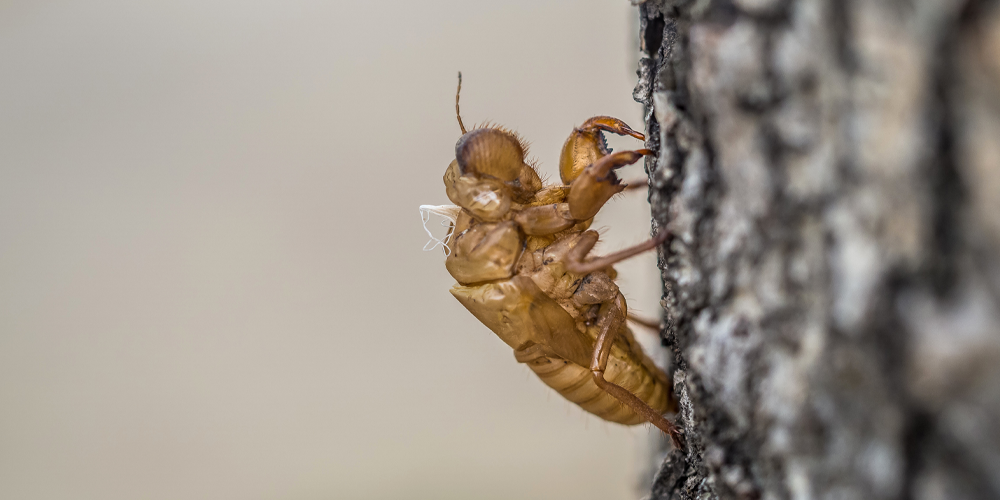
TEACHERS AS WRITERS: Winner
Home > 2023 Winning Entries > Teachers as Writers > Cicada Season
Cicada Season
by Megan Cartwright, Hawker College

In the summer of 1992, I had a cattle dog named Holly. She slept in a rusted forty-four-gallon drum and barked at the whir of cicadas. Their thrumming song heralded school holidays, when I spent lazy hours watching plump bodies unfurl from exoskeletons, tissue-paper wings turning translucent as they dried. My brother and I categorised the Greengrocers, Black Princes, and Double Drummers. We noted quantities in a scrapbook, attempting to best our daily tallies.
The neighbourhood kids dared one another to climb the ancient wattle tree in our backyard, reaching pollen-blind into the canopy to unhook brittle remnants of hatched insects. The acacia’s blackened branches strained, globules of amber sap cracking syrupy trails across my fingers. The honey-viscous blood had no discernible taste. We adorned our t-shirts with the shells in a display intended to intimidate local bullies.
The youngest Cluse boys were in my brother’s year at school. They enjoyed tormenting him on the afternoon bus. Trevor was painfully skinny, encased in a full-body compression suit. His third-degree burns were the result of a treehouse fire lit by his twin, white-haired Marcus.
In my clearest memory of Marcus, he is illuminated by the only streetlight in the cul-de-sac. He hunches, rolling his skateboard back and forth with a dirty foot, the metal bearings scoring white tracks along the curb. In the half-dark it takes a moment for me to know the thing writhing in his hand. Tiger-stripes of a Double Drummer. Marcus scarcely looks up, intent on separating thorax from abdomen.
Cicadas have a courtship song, a full-throated timbre. Their chorus reverberates in your gut as much as the male’s tymbal muscle. Pitiful that the distress call was a scream, pitched like the sirens of the police cars we often saw parked outside the Cluse house.
On my twenty-sixth birthday I returned to my former hometown to scatter my father’s ashes. I did not count myself among the tourists who crowded the supermarkets, stockpiling for the Easter weekend. I had swum in the harbour where the trawlers docked. I had borne witness to the corpse of a tiger shark, strung up by the tail, its prolapsed entrails reeking ammonia. I heard that the oldest Cluse boy – Brent – had died. An overdose.
Standing beside my brother, preparing to farewell Dad, I sensed the offspring of creatures we had catalogued as children dormant beneath our feet. It can take seventeen years for a nymph to reach maturity and tunnel to the surface. At that moment it felt like a tragedy, and a comfort.
Judges’ Comments
Taut, haunting and with a strong command of rhythm, ‘Cicada Season’ unfurls. The judges especially enjoyed the writer’s use of imagery and structure to unpack ideas of memory loss and returning home. ‘Cicada Season’ dances through memory and place with great nuance.






